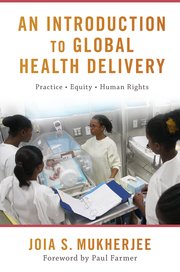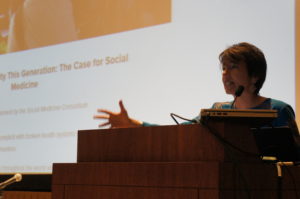Dr. Joia Mukherjee is an associate professor in the Division of Global Health Equity at Brigham and Women’s Hospital, and she has served as the Chief Medical Officer for Partners in Health since 2000. She recently published an undergraduate textbook titled, “An Introduction to Global Health Delivery.” This 12/21/17 blog post is from the Oxford University Press blog.
 Policy makers, organization, and governments have worked side-by-side with people living with AIDS as part of a global social movement for three decades. The success of the movement for HIV treatment access not only garnered billions of dollars of new money for HIV treatment, but also served to shift the public health paradigm from prevention-only to the provision long-term treatment. This paradigm shift ushered in a new era in global health. One that has strengthened health systems and treated a variety of conditions from non-communicable diseases, women’s health, mental illness, and cancer. Stronger and more resilient health systems are the result. Adult, child, and maternal mortality have dropped in many of the world’s poorest countries. UNAIDS recently announced that as of 2017, 21 million people have received antiretroviral therapy—the life-saving medications that have transformed AIDS from a fatal disease to a manageable and treatable one. READ MORE>>
Policy makers, organization, and governments have worked side-by-side with people living with AIDS as part of a global social movement for three decades. The success of the movement for HIV treatment access not only garnered billions of dollars of new money for HIV treatment, but also served to shift the public health paradigm from prevention-only to the provision long-term treatment. This paradigm shift ushered in a new era in global health. One that has strengthened health systems and treated a variety of conditions from non-communicable diseases, women’s health, mental illness, and cancer. Stronger and more resilient health systems are the result. Adult, child, and maternal mortality have dropped in many of the world’s poorest countries. UNAIDS recently announced that as of 2017, 21 million people have received antiretroviral therapy—the life-saving medications that have transformed AIDS from a fatal disease to a manageable and treatable one. READ MORE>>

